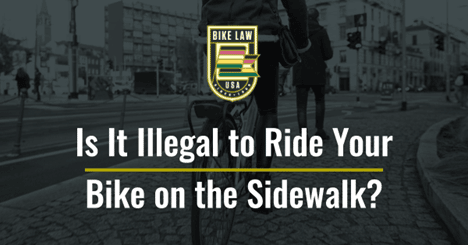
The laws dictating whether you can ride your bike on the sidewalk differ depending where you live. Different states have different laws on this matter, and local ordinances also vary. Let’s take a look at the legal framework behind various state laws related to cycling on sidewalks.
The laws of sidewalk-riding can be very complicated and vary from town to town, and sometimes from block to block. So please understand that this is just a general overview, and not legal advice and should not be relied on to analyze a specific scenario. Get in touch and we will find a local bike accident lawyer to help. That’s what we are here for.
Find Your State
Alabama
Alaska
Arizona
Arkansas
California
Florida
Illinois
Indiana
Iowa
Kansas
Kentucky
Louisiana
Maine
Maryland
Massachusetts
Michigan
Minnesota
Mississippi
Missouri
Montana
Nebraska
Nevada
New Hampshire
New Jersey
New Mexico
New York
North Carolina
North Dakota
Ohio
Oklahoma
Oregon
Pennsylvania
Rhode Island
South Carolina
South Dakota
Tennessee
Texas
Utah
Vermont
Virginia
Washington
West Virginia
Wisconsin
Wyoming
Alabama
According to Alabama law, bicycles are considered vehicles and are subject to the traffic laws that govern motor vehicles. State law prohibits any vehicles from driving on the sidewalk, and this law applies to bicycles. The state does not have any separate laws allowing bicycles to be ridden on the sidewalk.
Alaska
Sidewalk cycling is generally legal in Alaska, with the exception of riding on sidewalks in business districts or where an official traffic-control device prohibits doing so.
Arizona
In Arizona, bicycles are not defined as vehicles. Additionally, no Arizona statute mentions riding a bicycle on the sidewalk, so it is not explicitly prohibited or allowed under state law.
Cyclists in Arizona should check the local ordinances in their municipality for laws regarding sidewalk cycling. Even if it is legal on a statewide level, doing so in a city that bans it could result in fines.
Arkansas
No Arkansas state law mentions cycling on the sidewalk, but some cities and other municipalities have local ordinances that either prohibit or regulate riding your bike on the sidewalk.
Little Rock, North Little Rock, Hot Springs, and Maumelle have all either directly or indirectly prohibited riding a bicycle on the sidewalk, according to the Arkansas Department of Transportation.
Cyclists in Arkansas are legally considered the same as pedestrians when biking on crosswalks, with all of the same rights and duties. Cyclists in intersections are also required to yield to pedestrians and signal audibly when passing them.
California
No California statute specifically allows or prohibits riding a bicycle on the sidewalk. According to California Vehicle Code Section 21206, local governments have the right to make their own traffic ordinances, including those that govern bicycles.
The following five California cities have banned cycling on sidewalks:
- Carlsbad
- El Cajon
- Escondido
- National City
- Vista
In Los Angeles, cyclists may use the sidewalks as long as they are aware of pedestrians and operate their bicycles safely. Additionally, LA cyclists must be cautious when passing in front of storefronts. Santa Clarita allows cyclists to ride on the sidewalks in most parts of the city, but not in business districts.
Colorado
Colorado law permits sidewalk cycling. According to Colo. Rev. Stat. §§42-4-710; 42-4-1412(10), the only vehicles permitted on sidewalks are bicyclists, electric bicycles, and other human-powered vehicles. Cyclists are granted the same rights and duties as pedestrians.
Cyclists in Colorado are legally required to follow these rules when riding on sidewalks:
- Yield the right-of-way to pedestrians and give audible signals before passing pedestrians.
- Avoid riding a bicycle where it is prohibited by traffic control devices or local laws.
- Cyclists must dismount before entering crosswalks where required.
Connecticut
Connecticut cyclists are allowed to ride their bikes on sidewalks, as long as they abide by the following rules:
- Yield the right-of-way to pedestrians and audibly signal within a reasonable distance before passing pedestrians
- Be aware of local ordinances and avoid cycling on the sidewalk in jurisdictions where it is prohibited.
Delaware
Delaware state law allows cyclists to ride on sidewalks in most areas, and cyclists are legally considered the same as pedestrians when doing so. However, it is not legal to ride a bike on a sidewalk in the following situations:
- In a business district
- When official traffic-control devices prohibit it
- If there is a usable bicycle-only lane next to the sidewalk
Washington, DC
In the District of Columbia, bicyclists can ride on sidewalks as long as they do not create a hazard and follow these rules:
- Avoid riding in the Central Business District, except for sidewalks expressly designated for cyclists
- Do not ride in any area where it is expressly prohibited to do so
- Yield right-of-way to pedestrians
- Follow posted speed limits (or ride at a speed safe for weather conditions)
- Avoid leaving the sidewalk and entering the road too suddenly for drivers to react
Florida
Bicycles are legally defined as vehicles in Florida. However, Florida bike law still allows cyclists to operate their bikes on sidewalks and they have the same duties and rights as pedestrians while doing so. Florida cyclists must also yield to pedestrians they encounter and give an audible signal before passing them. Our Florida bicycle accident lawyers are here to help if you are injured in a sidewalk bicycle accident, ensuring you receive the compensation and support you deserve.
Georgia
Georgia law considers bicycles as vehicles in all circumstances, which means they are not permitted on sidewalks. The only exceptions are local ordinances that allow individuals ages 12 and under to ride on the sidewalk.
Hawaii
In Hawaii, bicycles can be operated on sidewalks (other than sidewalks in business districts) if the cyclist keeps their speed under ten miles per hour and yields to all pedestrians. Motorized bikes are not permitted on sidewalks.
Idaho
Cyclists are permitted to use sidewalks in Idaho as long as they yield to pedestrians and signal audibly before overtaking pedestrians and other cyclists. The only exceptions are local ordinances or areas where official traffic control devices (such as signs) specifically prohibit cycling on the sidewalk.
Illinois
Like many other states, Illinois allows cyclists to use sidewalks as long as they yield the right-of-way to all pedestrians and give an audible notification when they are about to overtake and pass them.
Indiana
No Indiana statute mentions riding a bicycle on the sidewalk, so it is neither allowed nor prohibited at the state level. Cyclists in Indiana should check their local ordinances for anything that mentions cycling on sidewalks. Some jurisdictions may have ordinances that allow cycling on the sidewalk, with certain requirements for cyclists that choose to do so.
Iowa
Iowa is one of eleven states with no state-wide laws regarding cycling on sidewalks. As with all states, cyclists should check their local ordinances, as some municipalities may have their own laws.
Kansas
There is no Kansas statute on sidewalk cycling. Kansas cyclists are considered separate from vehicles when on the road, but still have the same rights and duties as drivers.
Kentucky
Kentucky state law allows bicycles to be operated on sidewalks and in crosswalks unless local law or ordinance prohibits doing so. When on sidewalks, cyclists have the same rights and duties as pedestrians in the same circumstances.
Cyclists also have some mandatory rules for riding on the sidewalk:
- When pedestrians are present, cyclists must slow their speed to the pace of an ordinary walk. They must also slow down when approaching crosswalks, driveways, or other crossings where they might see a motor vehicle.
- Avoid suddenly leaving sidewalks or crosswalks and riding into the path of another vehicle in a way that could cause a hazard.
- Yield to pedestrians on all sidewalks and in all crosswalks.
Louisiana
There are no state-level laws that mention cycling on sidewalks in Louisiana.
Maine
Maine has no statute that specifically allows or disallows riding a bicycle on a sidewalk.
Maryland
Cycling on the sidewalk is generally prohibited in Maryland, except for municipalities that permit it through local laws and ordinances. In areas where sidewalk cycling is permitted, cyclists are also allowed to ride on crosswalks. Some municipalities also have ordinances that specifically prohibit cycling on any footpaths in the city – Baltimore is one example (see Subtitle 18 of the Baltimore City Code).
Massachusetts
Massachusetts law allows cyclists to ride on sidewalks outside of business districts if necessary due to safety concerns, unless signs or markings in the area prohibit it.
Michigan
Michigan state law allows bicycles to be operated on sidewalks, as long as the cyclist yields to pedestrians and provides audible signals with sufficient notice before passing pedestrians and other cyclists.
Cyclists who are riding on sidewalks have all of the same rights and legal duties that apply to pedestrians on the same sidewalk.
Minnesota
Cyclists can use their bikes on sidewalks outside of business districts, provided that they yield the right-of-way to all pedestrians and notify them before overtaking and passing them.
Mississippi
Mississippi has no state laws related to cycling on the sidewalk, but municipalities may have their own ordinances.
Missouri
Cycling on the sidewalk is legal in Missouri, as long as cyclists follow three rules:
- Do not ride a bicycle on a sidewalk in a business district
- Yield the right-of-way to any pedestrian and provide them with an auditory notice before passing them.
- Avoid operating a motorized bicycle on the sidewalk.
Montana
In Montana, cyclists are legally permitted to ride on sidewalks as long as they yield to pedestrians. They also have the same rights and legal responsibilities as pedestrians on the same footpath.
Nebraska
Nebraska allows cyclists to ride on sidewalks and in crosswalks and gives them the same rights and legal duties that apply to pedestrians in the same circumstances. Additionally, Nebraska cyclists must yield to pedestrians.
Nevada
Nevada has no state-level statute regarding cycling on the sidewalk, but local ordinances that either prohibit or allow it may apply.New Hampshire
Bicycles are legally defined as vehicles in New Hampshire, and the same rules and duties apply. This means that like motor vehicles, bicycles are not allowed to be operated on sidewalks.
New Jersey
While New Jersey law does not specifically prohibit sidewalk cycling, local ordinances often do. Additionally, the New Jersey Department of Transportation has stated that sidewalks are for pedestrians and that cyclists can cause accidents by using them. Young children are an exception, as sidewalks are safer for them.
New Mexico
Sidewalk cycling is neither permitted nor prohibited in New Mexico, but some local ordinances may state otherwise.
New York
The state of New York does not specifically allow or prohibit riding a bicycle on the sidewalk. However, New York City does not allow any to ride on any sidewalk unless an official posted sign indicates that it is permitted.
North Carolina
North Carolina is one of the eleven states without specific laws regarding cycling on sidewalks. Like the other ten states, laws may vary between municipalities.
North Dakota
Bicycles are classified as vehicles in North Dakota and are thus prohibited from use on sidewalks.
Ohio
There is no legal ban on sidewalk cycling at the state level in Ohio. However, many of the state’s cities have local ordinates that prohibit all sidewalk cycling.
In other cities, sidewalk cycling is permitted outside of business districts. This includes some of Ohio’s largest cities, such as Cleveland, Cincinnati, and Columbus.
Oklahoma
The state of Oklahoma has no statutes governing sidewalk cycling, but many large cities have local restrictions. Oklahoma City allows cyclists to use sidewalks when outside of business districts.
Oregon
In Oregon, cyclists are permitted to use sidewalks under the following conditions:
- They may not suddenly exit a sidewalk or crosswalk and enter the path of a vehicle without giving the vehicle sufficient space.
- Cyclists must always provide an audible warning before passing pedestrians
- Pedestrians must always be given the right-of-way by cyclists on the sidewalk
- Avoid speeds higher than an average walking pace when approaching or entering crosswalks or traffic.
- All cyclists have a responsibility to operate their bicycles safely on sidewalks and at all other times.
Cyclists are also granted the same duties and rights as pedestrians when using sidewalks. In addition, motorists are required to yield the right of way to cyclists on sidewalks. Cyclists who are injured by motorists who failed to yield can learn about their options from an experienced Oregon bicycle accident attorney.
Pennsylvania
According to the Pennsylvania Department of Transportation, cyclists may ride on sidewalks but must always provide pedestrians with right-of-way on both sidewalks and bicycle paths. As in many other states, cyclists are legally required to signal audibly when approaching and passing pedestrians.
Cycling on sidewalks is prohibited in business districts unless otherwise noted by a traffic sign or other official traffic control device.
Rhode Island
In Rhode Island, bicycles and other human-powered vehicles may be operated on sidewalks and along roadway crosswalks unless prohibited by signs posted in the area.
South Carolina
South Carolina law generally permits sidewalk cycling, but local laws may vary based on municipality.
South Dakota
Sidewalk cycling is permitted in South Dakota, with the following requirements:
- Cyclists must stop before entering crosswalks or highways from sidewalks and sidewalk areas
- The right-of-way should always be yielded to pedestrians and audibly signal before passing them
Tennessee
Tennessee does not have any law that prohibits cycling on sidewalks, so it is generally allowed except for municipalities with local ordinances against it.
Texas
The Texas Department of Transportation says that there is no state law against riding bicycles on sidewalks. Many municipalities have local ordinances against doing so, and this is often indicated by posted signs.
Utah
Utah permits sidewalk cycling with many of the same restrictions as other states:
- Pedestrians get the right-of-way
- Audible signals
- Reduce speed based on current conditions
- Sidewalk cycling is prohibited in areas where indicated by traffic control devices or local ordinances
Vermont
There is no Vermont law against sidewalk cycling, but major cities like Burlington have prohibited cycling on sidewalks in major areas of commerce.
Virginia
Unless otherwise prohibited by local ordinances, cyclists in Virginia may ride their bikes on sidewalks. They are legally considered pedestrians but must abide by the same right-of-way and audible signaling requirements found in many other states.
Washington
Cyclists are permitted to ride on sidewalks in Washington and are deemed to have the same duties and rights as pedestrians. They must yield to pedestrians and failing to do so could result in a fine of up to $500.
West Virginia
Sidewalk cycling policies are assessed at the local level in West Virginia, due to a lack of state laws on the subject.
Wisconsin
Wisconsin laws on sidewalk cycling vary on the local level. In areas where it is permitted, cyclists must yield the right of way, ride safely, and audibly notify pedestrians before passing them in the same direction.
Wyoming
Bicycles and other human-powered vehicles are permitted on sidewalks in Wyoming.
Legal Guidance For Cyclists
The laws of sidewalk riding can be very complicated and vary from town to town, and sometimes from block to block. So please understand that this is just a general overview, and not legal advice and should not be relied on to analyze a specific scenario. Get in touch and we will find a local bike accident lawyer to help. That’s what we are here for. Our team also has extensive experience in negotiating bike accident settlements to ensure injured cyclists receive the compensation they deserve.
Bike Law is a network of independent law firms across the country that represent injured cyclists and pursue cycling justice.

Bike Law founder and bicycle crash lawyer Peter Wilborn has raced, toured, commuted, and ridden his bike daily for fun. In 1998, Peter had a bike tragedy in his own family, realized firsthand the need for lawyers who understand cycling, and devoted his law practice to Bike Law.








